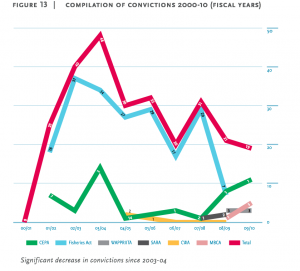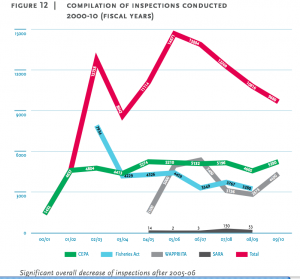In Getting Tough on Environmental Crime?, Ecojustice collates fragmentary, publicly available information to show the marked decline in federal environmental inspections and convictions since 2004. This includes important federal environmental laws, such as the Canadian Environmental Protection Act (CEPA), Fisheries Act, Species at Risk Act, Canadian Wildlife Act, Wild Animal and Plant Protection Regulation of International and Interprovincial Trade Act , Canada Shipping Act, and Migratory Birds Convention Act.
This includes important federal environmental laws, such as the Canadian Environmental Protection Act (CEPA), Fisheries Act, Species at Risk Act, Canadian Wildlife Act, Wild Animal and Plant Protection Regulation of International and Interprovincial Trade Act , Canada Shipping Act, and Migratory Birds Convention Act.
Ecojustice sums up its findings in two interesting graphs, found at pages 62 and 63 of the full report, which show a marked decline in the total number of inspections and convictions since 2004:
At page 69, Ecojustice highlights the discrepancy between the low number of convictions under CEPA and the Fisheries Act in relation to the number of inspections, warnings and investigations. They ask, correctly, how effective warnings can be, when successful prosecutions are rare. They also ask why enforcement activity has declined, or at least not shown a corresponding increase, despite increases in the number of enforcement officers in some areas.
They conclude that the government should do much more to make its enforcement activities transparent to the public, and should do more to enforce environmental laws generally:
“Although the annual reports, Enforcement Notifications and news releases provide a fragmented, incomplete picture of enforcement (and no picture at all of compliance and facility performance), our analysis has uncovered some key findings.
First, there are very few successful prosecutions under federal environmental legislation in Canada. In particular, under the Canadian Environmental ProtectionAct, the total number of convictions (approximately 20 of each per year) is still extremely small in relation to the number of inspections, warnings, and investiga- tions. The same critique may be levelled as regards Fisheries Act prosecutions and convictions.
Although we recognize that prosecutions are only one component of Environment Canada’s enforcement arsenal, its threat remains a major factor in ensuring compliance. Since the threat of a success- ful prosecution is crucial to the deterrent effect, these low absolute numbers give rise to concern regarding the overall effec- tiveness of the cepa enforcement regime. Ecojustice believes that the available data raises serious doubts about whether pros- ecution has been employed as an effective deterrent when just 23 convictions have been obtained over three past years, with an average fine of $10,524 per conviction.
Second, the important increases in cepa enforcement officers, which began in 2004-05, have only led to a slight increase in inspections from 2000-10. More importantly, neither of the increases in officers or inspections has been matched with a correspond- ing increase in investigations, written warnings, prosecutions or convictions. Over 10 years, the federal government has added more officers and completed more inspections, yet the numbers of investigations and prosecutions have failed to reach levels achieved earlier in the decade. Warnings remain the most frequently used enforcement tool. It is highly doubtful that this is a result of the full compliance achieved by industry and other regulated entities.
Finally, it appears that there has been a relatively consistent decline in these enforcement activities (warnings, orders, etc.) since 2005- 06—the year the Conservative government came to power—despite an increase in the number of inspector personnel dedicated to specific statutes, particularly under CEPA.
Canadians should be concerned by these findings.”
We congratulate Ecojustice for this very useful report. Its dispiriting conclusions dovetail with the report of the federal Environmental Commissioner, and our own experience, and backs them all up with carefully researched facts and figures, despite major obstacles. We agree: Canadians should be concerned by Ecojustice’s findings. We are.
